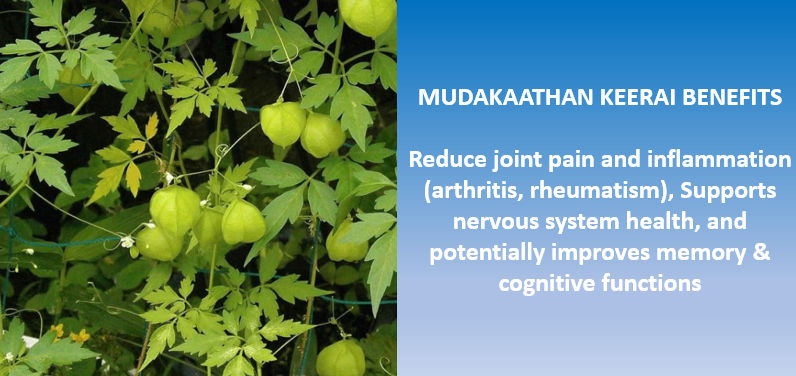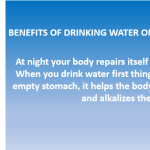Mudakathan Keerai (Balloon Vine or Cardiospermum halicacabum) is a green leafy plant widely used in traditional Indian medicine, particularly Ayurveda and Siddha. Known for its rich medicinal properties, it offers several health benefits, especially for elders. Below are some of the key advantages of incorporating Mudakathan Keerai in their diet:
Anti-inflammatory Properties
Mudakathan Keerai is highly regarded for its ability to reduce inflammation, making it especially beneficial for elders who often suffer from joint pain, arthritis, and other inflammatory conditions. Regular consumption or topical application (in the form of pastes or oils) can help alleviate symptoms of joint stiffness and swelling, improving mobility and comfort.
Relief from Arthritis and Rheumatism
Elders who experience arthritis, particularly osteoarthritis and rheumatoid arthritis, can benefit significantly from Mudakathan Keerai. It has analgesic properties that help reduce the severity of joint pain and muscular discomfort, offering a natural alternative to conventional painkillers.
Bone Strength and Joint Health
The plant is a good source of calcium and other minerals that support bone strength and joint health. Including Mudakathan Keerai in the diet of seniors can contribute to stronger bones and may help delay age-related degeneration, reducing the risk of osteoporosis.
Supports Respiratory Health
Mudakathan Keerai is often used to treat respiratory problems such as asthma, cough, and bronchitis. For elders prone to respiratory issues, it acts as an expectorant, helping to clear mucus and ease breathing difficulties. This is particularly helpful in maintaining respiratory health in older adults.
Boosts Digestive Health
Mudakathan Keerai has mild laxative properties, which can aid in relieving constipation—a common issue among elders. It supports healthy digestion and helps regulate bowel movements, ensuring a smoother digestive process.
Rich in Antioxidants
The leaves are packed with antioxidants that combat oxidative stress and reduce free radical damage. For elders, this can contribute to reducing the risk of age-related chronic diseases like heart disease, diabetes, and neurodegenerative conditions, while promoting overall vitality.
Improves Skin Health
Elders often face skin problems like dryness, infections, and itchiness due to aging. Mudakathan Keerai is known for its ability to treat skin-related issues such as eczema and rashes. When used topically, it soothes irritated skin, promotes faster healing, and keeps the skin healthy.
Natural Pain Relief
Apart from arthritis, Mudakathan Keerai has been used for centuries to relieve general body pain, muscle soreness, and cramps, which elders frequently experience. Its analgesic properties make it an excellent remedy for providing natural pain relief without the side effects of conventional medications.
Supports Nervous System Health
Mudakathan Keerai is believed to have neuroprotective benefits, which can help support the nervous system’s overall health in elderly individuals. It is thought to improve memory, concentration, and general brain function, potentially reducing the risk of aging-related cognitive decline.
How to Consume Mudakathan Keerai
Mudakathan Keerai can be used in several ways:
- As a vegetable: The leaves can be cooked into dishes such as soups, stir-fries, or incorporated into traditional recipes like dosas, chutneys, or sambar.
- Herbal decoctions or teas: Leaves can be boiled and consumed as a tea to harness its medicinal benefits.
- Topical application: Mudakathan Keerai paste or oil can be applied to inflamed joints, skin irritations, or other affected areas for pain relief and healing.
Conclusion
For elders looking for natural remedies to alleviate the common ailments of aging—such as joint pain, poor digestion, respiratory issues, and skin problems—Mudakathan Keerai offers a range of health benefits. Its anti-inflammatory, analgesic, and antioxidant properties make it a valuable addition to their daily regimen, promoting overall well-being and enhancing quality of life. However, it’s always recommended to consult a healthcare professional before making significant changes to diet or treatment plans, especially for those on medications.



